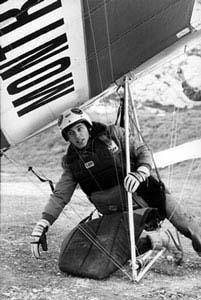Bertrand Piccard
[6] Piccard and Jones, in cooperation with a team of meteorologists on the ground, maneuvered into a series of jet streams that carried them 25,361 miles to land in Egypt after a 45,755 km (28,431 mi) flight lasting 19 days, 21 hours, and 47 minutes.
[6] In recognition of this accomplishment, Piccard received awards including the Harmon Trophy, the FAI Gold Air Medal and the Charles Green Salver.
[citation needed] During November 2003, Piccard announced a project, in cooperation with the École Polytechnique Fédérale de Lausanne (EPFL), for a solar-powered, long-range aircraft named Solar Impulse.
[8] Owing to international funding for the project, the Solar Impulse is a European craft, not a Swiss one, despite scientific and medical assistance from the EPFL and Hirslanden Clinique Cecil.
In order to switch pilots, stopovers were scheduled at locations in India, Myanmar, China, The United States, and southern Europe or northern Africa.
Piccard piloted the ninth segment of the round-the-world trip and landed the Solar Impulse 2 (Si2) in Moffett Field in California on 24 April 2016 after three days of flying from Kalaeloa Airport, Hawaii.
[11] For his role in delivering and piloting Solar Impulse, Bertrand was awarded the Mungo Park Medal by the Royal Scottish Geographical Society in 2018.
[13] Four months after the completion of the flight, during the 2016 United Nations Climate Change Conference, Piccard and the Solar Impulse Foundation launched the UNEP-endorsed non-profit World Alliance for Clean Technologies.
[14] In January 2018 Piccard told the Economic Times that in his travels he had collected more than 500 ideas to protect the environment that were also profitable from a total of five continents.
Its goal is to select innovative solutions to the environmental crisis and promote them to decision-makers in order to accelerate the transition to a sustainable economy.
The Label is awarded to solutions which contribute to the achievement of one of the five Sustainable Development Goals related to water, energy, consumption and production, industry, cities and communities.
